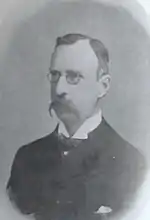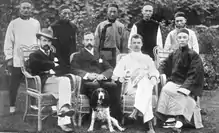Frederick Samuel Augustus Bourne
Sir Frederick Samuel August Bourne CMG (1854–1940) was a British judge, diplomat and botanist who served in China. His last positions before retirement were concurrently as Assistant Judge of the British Supreme Court for China and Judge of the High Court of Weihaiwei.
Sir Frederick Bourne CMG | |
|---|---|
 | |
| Assistant Judge, British Supreme Court for China | |
| In office 1898–1916 | |
| Preceded by | George Jamieson |
| Succeeded by | Skinner Turner |
| Judge, British High Court of Weihaiwei | |
| In office 1904–1916 | |
| Preceded by | New position |
| Succeeded by | Hiram Parkes Wilkinson |
| Personal details | |
| Born | 3 October 1854 Winfarthing, Norfolk |
| Died | 23 August 1940 (aged 85) Mayfield, Sussex, England |
Early life
Bourne was born on 3 October 1854. He was the son of Rev. S. W. Bourne, Rector of Winfarthing, Norfolk, and Mary Caroline, daughter of late Henry Cassin, M.D. His father had died leaving "a widow and six children in reduced circumstances." At the age of 18, Bourne commenced work as a clerk in the War Office.[1]
Consular career

He had been advised that "pay and prospects were better in China" and started studying for the Foreign Office exam. He passed a competitive exam on 14 February 1876 and was appointed a student interpreter in China on 10 March 1876.[2]
Bourne served all over China, including Guangzhou, Chongqing, Pagoda Island (near Fuzhou), Wuhu and Tamsui (near Taipei).[3] While in Chongqing he had gone on a six-month tour through modern-day Sichuan, Yunnan, Guangxi and Guizhou to report on the potential for trade. His report was presented to both Houses of the British Parliament in June 1888. From 1896 to 1898, Bourne was consul in charge of a mission by the Blackburn Chamber of Commerce to investigate trade with China.[4]
Botanist
Bourne was also a keen botanist. He collected various botanical samples when in China and has two species of plants named after him, the Bournea sinensis and Bournea leiophylla.[5]
Judicial career
Bourne was called to the bar of Lincoln's Inn in 1890 during long leave at home in England.
In 1898, he was appointed Judge of the British Supreme Court for China and Japan based in Shanghai replacing George Jamieson,[6] and serving under Chief Justice Nicholas John Hannen. Following Hannen's death, Hiram Shaw Wilkinson was appointed Chief Justice. In 1901 the position was renamed Assistant Judge.[7] Bourne served as Acting Chief Justice of the court in 1900 and between 1902 and 1903 when Wilkinson was on long leave and as Acting Judge between 1908 and 1909 and in 1911 and 1914 when the then Chief Judge Havilland de Sausmarez was on leave.[8]
In 1904, Bourne was appointed Judge of the High Court of Weihaiwei. He held the position concurrently with his position as judge in Shanghai.[9]
He was made a Companion of the Order of St Michael and St George in 1909[10]
Bourne retired in 1916. Skinner Turner was appointed as the Assistant Judge in his place. Bourne was knighted just before his retirement.[11]
Death

Sir Frederick Bourne died on 23 August 1940 at the Firs, Mayfield, Sussex England.[12]
A stained glass window, designed by Christopher Webb, in St Dunstan's Church, Mayfield, Surrey has been dedicated to the memory of Bourne and his wife, Alice.[13]
Publications
Bourne published the following books:
Further reading
- Clark, Douglas (2015). Gunboat Justice: British and American Law Courts in China and Japan (1842-1943). Hong Kong: Earnshaw Books., Vol. 1: ISBN 978-988-82730-8-9; Vol. 2: ISBN 978-988-82730-9-6; Vol. 3: ISBN 978-988-82731-9-5
References
- P.D. Coates, The China Consuls, pp308 and 346
- P.D. Coates, The China Consuls, pp308 and 346
- Foreign Office List 1917, p 209
- China No. 1 (1888) Report by Mr FSA Bourne of a Journey in South-Western China.
- Entry for Bournea in The Genera of Gesneriaceae: Basic information with illustration of selected species
- Foreign Office List 1917, p 209
- London Gazette 26 April 1901
- Straits Times, 20 November 1915, p10
- Clark, Douglas, Gunboat Justice, Vol 2, p28
- London Gazette, 25 June 1909, p4856
- Straits Times, 20 November 1915, p10; London Gazette, 22 February 1916, p1946
- Obituary, The Times, 27 August 1940; London Gazette, 6 June 1941, p3250
- St Dunstan Parish Church, Mayfield, Sussex - 31 December 2003 and TQ5827 : Stained glass window, St Dunstan's church, Mayfield